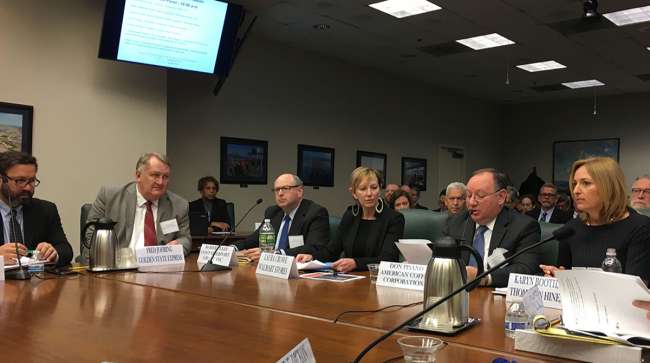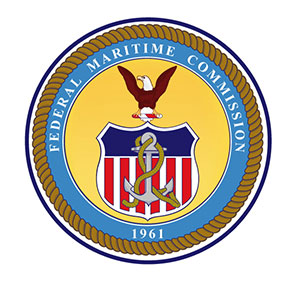Truckers, Cargo Owners Ask FMC to Set Guidelines on Detention, Demurrage

WASHINGTON — Cargo owners and trucking companies urged the Federal Maritime Commission to issue guidelines on charging detention and demurrage fees during events such as weather emergencies, labor slowdowns or supply chain meltdowns.
During hearings hosted by FMC here Jan. 16-17, executives representing the entire supply chain discussed whether to charge fees when things go haywire.

The Coalition of Fair Port Practices, a group of trade associations, said ocean carriers and terminal operators have charged fees to truck companies and beneficial cargo owners (BCOs) in the past, including during the West Coast port labor strife in 2014 and 2015, the Hanjin Shipping Co. bankruptcy in 2016 and after snowstorms and hurricanes when it has been nearly impossible to pick up and return containers. If a problem is not within the control of the trucker, then the detention and demurrage fees should not apply, according to the coalition, which petitioned the commission to issue a statement to discourage these “unfair business practices.”
Typically, ocean carriers and terminal operators allot a “free time” window to the cargo owner. If the trucker does not pick up the container within the period, the cargo owner is assessed a demurrage fee. If a trucker takes too long to return the container, a detention fee applies.
But truckers, freight forwarders and cargo owners said that the other parties are often too inflexible on the rules.
“The status quo is unfair, patently discriminatory and burdensome at best,” Mohawk Global Logistics Vice President Richard Roche said.
Ocean carriers and terminal operators countered that the status quo is working fine, and cargo owners should address any concerns in contract negotiations rather than seeking federal intervention. They also said that containers sitting idle hurts productivity, carrying real costs and lost revenue.
Laura Crowe of @Walmart discusses how it took longer to be able to pull containers this past year in Southeastern ports due to increased congestion at the terminals. @TransportTopics pic.twitter.com/b0rWsyaJOD — Ari Ashe™ (@ariashe) January 16, 2018
Laura Crowe, senior director of global logistics at Wal-Mart Stores Inc., said it is easier to negotiate detention and demurrage on the West Coast — where there is intense competition among ports and private terminal operators — than in regions where the port authority operates container terminals.
“We want to be able to feel more like a partner, so we can have a conversation about it, versus being dictated to that we must pay a fee that we feel is unreasonable,” Crowe said. “We budget for demurrage. We know we’re going to have to pay some. We just want it to be fair.”
During the hearings, commissioners asked why cargo owners and truckers have not filed a complaint to put the matter before an administrative law judge, and also how were they to define “unreasonable” conduct.
Don Pisano, president of the American Coffee Corporation, explained that the time necessary to pursue each case would interrupt and harm his small business.
John Butler, CEO of the World Shipping Council, representing ocean carriers, said that there could be other questions involved. “How congested does it have to be? Are you going to set metrics for changes in throughput? Who decides? When do you decide? If you get sucked into this, it has repercussions on how to apply the standards. If the idea is to get more clarity, I think you’ll find you’ve created more confusion,” he said.
Ocean carrier executives also argued the cargo owners choose their ports, terminals and transportation partners and can lever the free market to establish standards on detention and demurrage.
“Are there situations that happen? Yes. Sometimes it’s our fault. Sometimes it’s the shippers fault. But generally, since we’re in a very competitive business, we try to work these situations out,” said Howard Finkel, executive vice president of Cosco Shipping Lines (North America).
Richard Craig, president of Mitsui O.S.K. Lines (MOL America), insisted the fees are not back-door revenue generators.
“Going back to Hurricane Sandy in 2012, MOL has, in aggregate, absorbed more in demurrage expenses from the terminals than we’ve collected from our customers. This is not a money maker for us,” Craig said.
Truckers also blamed the terminal operators for heavy congestion and rigid schedules.
Robert Leef of ContainerPort Group mentions problems at the Port of Baltimore in 2017, and previous cases being charged unfairly at the Port of Virginia during snowstorms. @TransportTopics pic.twitter.com/KWcjuXxiay — Ari Ashe™ (@ariashe) January 16, 2018
Even though vessel sizes have quintupled since the 1980s, staffing and hours of operation at some terminals have not increased enough, said Robert Leef, senior vice president of the east region at ContainerPort Group Inc.
Golden State Express President Fred Johring testified that often he has a truck and driver ready to pick up a container, but no appointments are available within the free time. “The answer I received recently [from a terminal operator] on three containers was, ‘Sorry, pay the demurrage. The next available appointment is on Saturday.’ Thankfully, it was open on Saturday because it cost $675 instead of $1,800 on Monday,” he said.
Fred Johring of Golden State Express talking about his trucking company’s problems with long turn times at the @PortofLA @portoflongbeach meaning less productivity. @TransportTopics pic.twitter.com/IDWJJ5QwVU — Ari Ashe™ (@ariashe) January 16, 2018
However, terminal operators pointed the finger back at ocean carriers, truckers and cargo owners. Edward DeNike, president of SSA Containers, said terminal operators should not be characterized as the bad actors. “A very small percentage, less than 10%, is actually demurrage that is attributed to the docks and 90% is demurrage we’re told by the ocean carrier to collect at the same time we collect our dock demurrage,” he said. After the hearings though, two industry executives told Transport Topics that they were perplexed at the math behind the comment.
Michael Khouri, acting chairman of the Federal Maritime Commission, said a closed session will be held after the comment period closes on Jan. 26 to decide on the petition.

